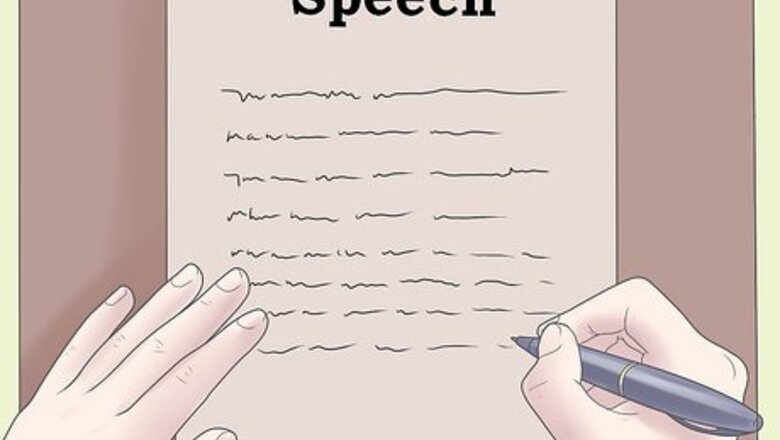
views
- Summarize the main points of your speech to remind listeners what they've learned.
- Recall something from the introduction so your speech comes full circle.
- Thank your audience for attending and listening.
Concluding Your Speech
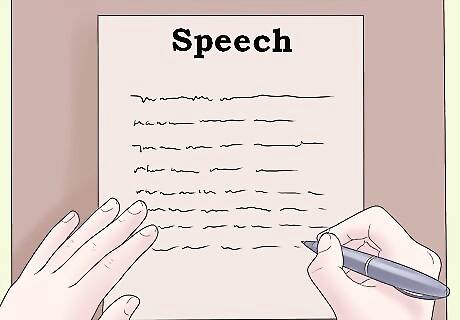
Summarize the main points you made throughout the speech. The most important thing for a conclusion to accomplish is to remind the listeners of what they should have learned throughout the speech. If the introduction tells the audience what they will learn, and the body tells the audience the content they should be learning, the conclusion should repeat those main ideas one final time. Use the chance to repeat your thesis a final time, if necessary. What's the one thing you hope someone remembers from your speech? What's the one thing that needs to be learned? In informal speeches, repeating the main points won't be necessary. If you're giving a toast at a wedding, you don't need to run back through a list of the great things about the groom.

Bookend your speech. In some cases, the conclusion might recall the introduction, helping to illustrate that the speech has come full circle. If you used an example or a specific case study reference in your introduction, then you can return to that example in your conclusion. This can be an excellent way of book ending the speech and keeping people interested. If you started the speech by drawing a sad portrait of a recently returned veteran who couldn't get work, or health insurance, and ended up in dire straits, that can be a heart-breaking intro. Pick back up with the story in conclusion to let you know where that vet is now. Any kind of reference can work. If you started a speech with a quote by Thomas Paine, end with more about Thomas Paine. The bookend technique is an excellent way of signaling the end for the audience.

Make the topic seem important. The speech should do a lot to present a case and lots of details to your audience, but the conclusion can be a great opportunity to make those points important. Depending on the nature of your speech, if you've just presented a lot of complex details about climate change, the ending might be an appropriate time to introduce your first case study, or personal example that will help to drive home the facts that you've just presented. Make it real for your audience. Put a face on things. Case studies and personal examples are extremely effective in helping an audience connect with a complicated issue or topic. Some people like to use this technique for the introduction, but it can be unexpected and even more effective to wait and use it at the conclusion, especially for speeches that are a little bit shorter.
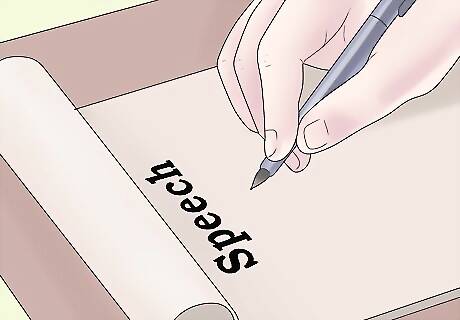
Use a signal phrase from your title. If you've written a speech with an eye-catching title, use that as an opportunity to signal that you're coming to the end by repeating it, or explaining it, or even just using it in the language of the speech naturally. People will perk up when they hear the title automatically, because it will seem important. This can happen at any time during the speech, but it's perhaps most effective at the end. "We can turn back the oceans and stop the warming of our planet. It's not too late, as the title of my speech promises. It's not too late for any of us."

Don't be afraid of using the phrase "in conclusion." Lots of people overthink the conclusion. You don't need to outsmart it. If you're nearing the ending, don't be afraid to say so, and use the phrase, "In conclusion," to signal that you're getting close to the close of your speech. It's one sure way to let people know that you're almost done, and then should be perking up for your final points.

Thank the audience to signal the ending. One nice transitional move to signal that you're coming to the close of an informal address or toast is to thank the audience for listening and participating in the proceedings. This can be a good way to transition into your final paragraph, or into the last point that you want to make. The audience will tend to sit up a little when they realize the end is in sight. It's also appropriate to use a "thank you" as the very last thing that you say: "We must continue fighting the good fight on climate change, for our children, for our economy, and for ourselves. Thank you." Cue applause. Sometimes, it's also appropriate to ask for questions if the occasion calls for it. People should be sure your speech is over, but if people seem hesitant, it's ok to say, "I'd be happy to take questions, if anyone has them."
Nailing the Ending
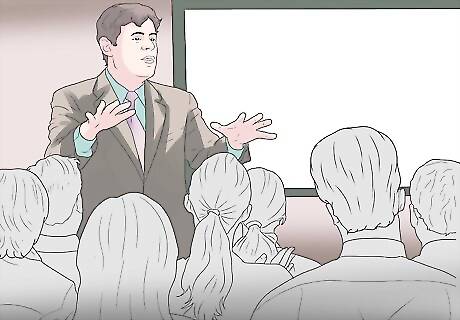
Slow down the speed of your speech at the end. An excellent technique to get people to perk up and really hit your most important points is to slow down the speech. Slow it down a lot. Take longer pauses in between your words, and put calculated pauses at particular points to help drive home your main ideas one final time. If someone missed the rest of the speech, they should be able to get something just form this. "The fight for climate change (pause ) is a fight (pause) that we must (pause) win. Our children (pause). Our children's children (pause). Demand it."

End on a high note. If you've just presented a really grim portrait, or a really technical series of details throughout a speech, the ending can be a great time to lighten things up a bit and end on a positive note. Letting people know that the situation is changeable, and that things aren't quite so bleak can help to get your audience energized. Return to the story of the veteran struggling to find work. With the sorts of infrastructure you're calling for in your speech, maybe he could be working a specific job, and getting into his own house, and even starting to plant a garden in the yard, something he always wanted to do. Dream a little, and let your audience do the same.

Try repetition. Repeating a phrase or a couple of lines can be a great way to hammer home a couple of points and let your speech end with a bang. You can repeat whole phrases, or use parallel sentence structure to end your speech with repetition. "We must do this for our children, we must do this for our neighbors, we must do this for America, we must do this for the world, we must do this for the oceans, we must do this for the forests..." "Politicians can't legislate this. Architects can't build this. Artists can't dream this. Developers can't innovate this. Only you can do this."

Use a call to action. Persuasive speeches require you to come up with a solution to a particular problem, and an excellent way of ending a speech like this is to let your audience know exactly what they can do, now, to make the kind of change you're talking about. End by projecting a telephone number they can call, or by getting them signed up for a particular mailing list about an issue, or helping them learn to contact their congress person to talk up this issue. Actually pass around a sign-up sheet if necessary. Get them involved. Address the audience specifically. Start using "you" toward the end of the speech, or address an individual in the audience to help bring it home.
Avoiding Common Mistakes
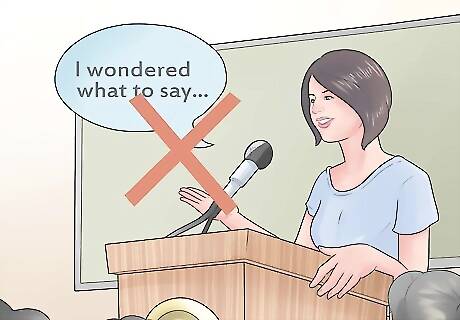
Don't end abruptly. One of the worst ways to end a speech is to just run out of steam, as if someone had cut you off. Even if you suspect you're running long, take the time to end the speech properly and sum up your final points in a clear and direct way. Don't just drop the mic and walk off. Avoid using any of the following kinds of last-lines: "Well, that's pretty much it." "That's it." "I'm done."

Don't ramble out. The ending is a bad time to go off-script. If you've got a good finish cooked up, but suddenly remember another thing you wanted to say, don't try to jam it back in when you're supposed to be wrapping up. The ending is one of the most important parts, so be sure you get it right and make it clear. Go for short and concise, not long and rambling. When the speech is over, don't keep talking. Even if you just remembered a point you forgot to make a few minutes ago, don't launch back into the speech when people are clapping, or once they're finished. When the speech is over, let it be over. If there's a chance for Q & A, then get to it then.

Don't apologize, even self-deprecatingly. Public speaking is hard, but don't make it worse by drawing attention to your shortcomings. If you think the speech hasn't gone well, or that you've gone on too long, don't end by drawing attention to the fact. This won't make it any better. You'll only serve to end the speech by highlighting the absolutely worst element of it.
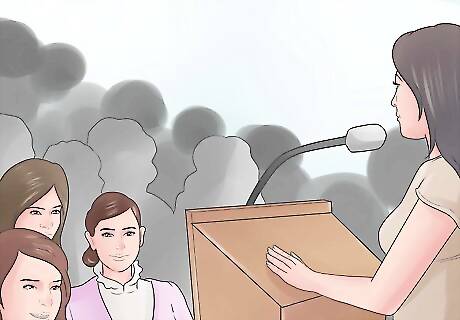
Don't introduce a new point in the ending. The ending is a time to sum up and repeat the main ideas, not to throw a curve ball into things. Even if you think it would be a surprise, or would be more shocking at the end of the speech, don't use the final moments to try to explain one more complicated thing. Let the audience start slowing down their brains and transitioning into something else.

Don't use a conclusion that's very different than the rest of the speech. If you're giving a speech about the horrors of war, it would be inappropriate to use a call-and-response ending, or some kind of audience participation gimmick that would be out of the purview of the rest of the speech. Don't do something drastically different and risk ruining the tone for the rest of the speech. Some speeches can be leavened with a bit of humor in the ending. If you've just given a particularly touching toast at a wedding, it might be good to release a bit of the tension with a well-placed gag. Probably not so much for a professional presentation.
















Comments
0 comment